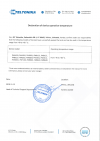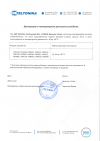FMB920 Declaration of device operation temperature: Difference between revisions
| Line 2: | Line 2: | ||
==Attachements== | ==Attachements== | ||
[[image:Temperature declaration.png|thumb| | [[image:Temperature declaration.png|thumb|100px|FMB920 Declaration of device operation temperature 2018-11-15 ]], | ||
[[image:Декларация о температурном диапазоне устройства.png|thumb| | [[image:Декларация о температурном диапазоне устройства.png|thumb|100px|FMB920 Декларация о температурном диапазоне устройства 2018-11-20 ]] | ||
Revision as of 10:51, 21 November 2018
Main Page > Basic Trackers > FMB920 > FMB920 Certification & Approvals > FMB920 Declaration of device operation temperature
Description
An operating temperature is the temperature at which an electrical or mechanical device operates. The device will operate effectively within a specified temperature range which varies based on the device function and application context, and ranges from the minimum operating temperature to the maximum operating temperature (or peak operating temperature). Outside this range of safe operating temperatures the device may fail.
Ranges
Most devices are manufactured in several temperature grades. Broadly accepted grades are:
- Commercial: 0 ° to 70 °C
- Industrial: −20 ° to 85 °C
- Military: −55 ° to 125 °C
The use of such grades ensures that a device is suitable for its application, and will withstand the environmental conditions in which it is used. Normal operating temperature ranges are affected by several factors, such as the power dissipation of the device. These factors are used to define a "threshold temperature" of a device, i.e. its maximum normal operating temperature, and a maximum operating temperature beyond which there is no guarantee that the device will continue to function as intended.
Attachements

,

